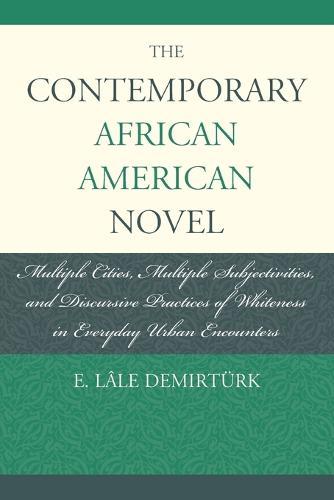Overview
This book examines the post-1990s African American novels, namely the “neo-urban novel,” and develops a new urban discourse for the twenty-first century on how the city, as a social formation, impacts black characters through everyday discursive practices of whiteness. The critique of everyday life in a racial context is important in considering diverse forms of the lived reality of black everyday life in the novelistic representations of the white dominant urban order. African American fictional representations of the city have political significance in that the “neo-urban novel” explores the nature of the American society at large. This book explores the need to understand how whiteness works, what it forecloses, and what it occasionally opens up in everyday life in American society.
Full Product Details
Author: E. Lâle Demirtürk
Publisher: Fairleigh Dickinson University Press
Imprint: Fairleigh Dickinson University Press
Dimensions:
Width: 15.40cm
, Height: 2.00cm
, Length: 22.60cm
Weight: 0.381kg
ISBN: 9781611477009
ISBN 10: 161147700
Pages: 254
Publication Date: 12 June 2014
Audience:
College/higher education
,
Professional and scholarly
,
Postgraduate, Research & Scholarly
,
Professional & Vocational
Format: Paperback
Publisher's Status: Active
Availability: In Print

This item will be ordered in for you from one of our suppliers. Upon receipt, we will promptly dispatch it out to you. For in store availability, please contact us.
Reviews
Lale Demirturk's critical study of the African American neo-urban novel draws together an impressive array of postmodern theory and criticism. This in-depth analysis of novels by six contemporary American writers convincingly demonstrates how these novelists ultimately subvert the discursive power of normative whiteness. The study's interpretative framework is aptly applied to a range of texts, from Walter Mosley's popular detective fiction to Percival Everett's and John Edgar Wideman's arguably more literary works. The internationalist perspective of the book provides an intriguing angle on how these cutting-edge writers re-imagine the everyday realities of the American urban landscape. Theoretically assured and richly detailed, Demirturk's study will prove a rewarding read for serious students of African American literature. -- Bonnie Tusmith, Associate Professor, Washington State University Lale Demirturk's new text importantly demonstrates how black people contest urban spaces as tropes of black criminality and savagery in need of white control and how, through such acts of contestation, black bodies are able to re-signify such urban spaces as sites of agential identity formation in relationship to white hegemony. Demirturk's text, which makes a significant contribution to African American literature, whiteness studies, and the dynamics of racialized urban space, is as much an intelligent and splendid analysis of the African American neo-urban novel as it is a text that infuses her own identity as an ally of black people. -- George Yancy, Duquesne University
Lale Demirturk's critical study of the African American neo-urban novel draws together an impressive array of postmodern theory and criticism. This in-depth analysis of novels by six contemporary American writers convincingly demonstrates how these novelists ultimately subvert the discursive power of normative whiteness. The study's interpretative framework is aptly applied to a range of texts, from Walter Mosley's popular detective fiction to Percival Everett's and John Edgar Wideman's arguably more literary works. The internationalist perspective of the book provides an intriguing angle on how these cutting-edge writers re-imagine the everyday realities of the American urban landscape. Theoretically assured and richly detailed, Demirturk's study will prove a rewarding read for serious students of African American literature. -- Bonnie Tusmith, Associate Professor, Washington State University Lale Demirturk's new text importantly demonstrates how black people contest urban spaces as tropes of black criminality and savagery in need of white control and how, through such acts of contestation, black bodies are able to re-signify such urban spaces as sites of agential identity formation in relationship to white hegemony. Demirturk's text, which makes a significant contribution to African American literature, whiteness studies, and the dynamics of racialized urban space, is as much an intelligent and splendid analysis of the African American neo-urban novel as it is a text that infuses her own identity as an ally of black people. -- George Yancy, author of Look, A White! Philosophical Essays on Whiteness
Author Information
E. Lâle Demirtürk is associate professor of American literature in the Department of American Culture and Literature at Bilkent University in Ankara, Turkey.




